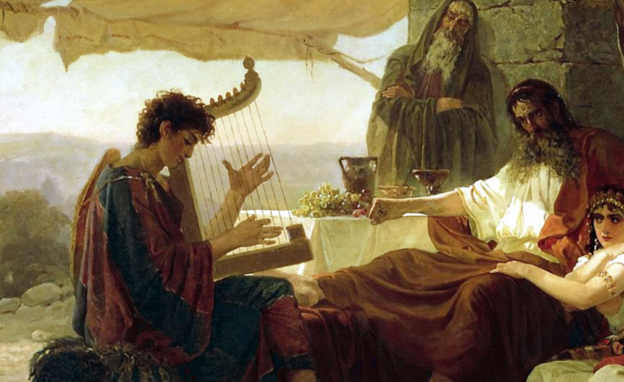If only the Christian walk was easy, with no obstacles in the path. If only the nations supported and rejoiced in God’s goodness towards us, and did not act with malice. Yet sadly, the Christian walk is one that contains difficulties and trials, although these have a good purpose in sanctifying us and growing us in Christ.
For David, that road of difficulty was quickly approaching. While his victory over Goliath won him accolades and the godly devotion of Jonathan, Crown Prince of Israel, all was not well. Saul’s vanity would quickly turn to envy, and from there to calculated attempts to rid himself of the competition. Despite this, God’s goodness to David continued to shine. David would not succumb to Saul’s envy.
After David’s victory over Goliath, it was fair to say just about everybody loved David. The army loved him. The people loved him. Jonathan loved him. Saul was on the fence though. This would quickly change.
Even as they returned from the battlefield, the victory songs began. “Saul has struck down his thousands, and David his ten thousands” the women injudiciously sang (vv.6-7). Never a good idea to praise the king less than the servants. Worse still, it was the wrong one to praise – God was the victor, not David (the instrument). Hardly a ringing endorsement of Israel’s spiritual state.
Saul noticed, and made a note. He was angry (v.8). David was a watched man from then on (v.9).
The next day, Saul’s harmful spirit came upon him, and twice he attempted to spear David (vv.10-11). The behaviour must not have seemed that out of place, because it did not affect David.
Yet it affected Saul. He realised that God was with David, protecting him (v.12). After all, Saul was not one to miss. So Saul made David an army commander (v.13). But even in this, God’s goodness was apparent, as David won victory after victory (v.14). Saul was in fearful awe, the nation smitten (vv.15-16). Saul probably realised that this was the successor Samuel had promised would inherit his throne.
Still, threats can be dealt with. In the cold calculus of life, the coin of life will not always turn up heads. Saul offered his eldest daughter as a wife, provided David kept fighting the Philistines (v.17). David politely and humbly declined the offer, so for whatever reason Saul married her off to another (vv.18-19).
However, his other daughter Michal had eyes for David; here, thought Saul was his chance to use Michal as bait for his purposes (vv.20-21). So Saul offered Michal, and had his servants convince David to marry into the dynasty (v.22).
While David thought himself a little financially short-handed for Michal’s hand, Saul made it known through his servants that money was no object. If he was short of cash, 100 enemy Philistine lives would pay the bride price just as nicely (vv.23-5). Unfortunately, this was again Saul trying to create opportunities for David to trip over a Philistine spear.
Yet God continued in goodness to David. David took the offer, but doubled it to show the value of Michal (vv.26-7). David and Michal were duly married.
But Saul was horrified. Not with the deed, or even the extra numbers, but because “Saul saw and knew that the LORD was with David” (v.28) and protected him even in the schemes Saul created. Not only that, even his younger daughter loved this rival. Saul was even more afraid, and David whether he knew it or (likely) not, had an enemy (v.29).
The Philistines, angered by the slaughter of 200 of their men, went out to battle against Israel. Yet despite this, God was good to David, and David’s success was head and shoulders above the other servants of Saul (v.30).
Saul’s envy was impotent, because of God’s goodness. The contrast in David’s success and Saul’s failure is telling. The difference is not blind luck or the fates, but God’s goodness to David. It demonstrates that God is often quietly working in the background, throughout our difficulties, to work things for our good (Rom 8:28).
We often think that God’s goodness must mean miraculous intervention, as sometimes happened in the Old Testament or the Gospels. Yet just as often, God’s goodness is demonstrated by a quiet working away. How is he protecting us today? One to ponder, and give thanks for…
That goodness is not given to us because we have earned it, though, but because Jesus earned it for us. Jesus’ life was filled with situations of peril and strife, but God’s goodness kept him until the appointed hour of his death for us. Because God was with him. Because Jesus was both God and man, and thus the only man deserving of glory and praise.
Through Jesus, we are blessed by God. Through Jesus, we receive God’s favour. In Jesus, we are kept and comforted through trials, to make us more like Christ. In Jesus, the world’s envy cannot overcome God’s goodness to us.


